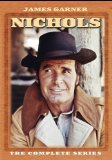| Reviews & Columns |
|
Reviews DVD TV on DVD Blu-ray 4K UHD International DVDs In Theaters Reviews by Studio Video Games Features Collector Series DVDs Easter Egg Database Interviews DVD Talk Radio Feature Articles Columns Anime Talk DVD Savant Horror DVDs The M.O.D. Squad Art House HD Talk Silent DVD
|
DVD Talk Forum |
|
|
| Resources |
|
DVD Price Search Customer Service #'s RCE Info Links |
|
Columns
|
|
|
Nichols: The Complete Series (a.k.a. James Garner as Nichols; Warner Archive Collection)
"If you want to know the truth, you make it up."
Initially wobbly...but quickly delightful, quirky cult comedy Western. Warner Bros.' Archive Collection of hard-to-find library and cult titles has released Nichols: The Complete Series, a 6-disc, 24-episode collection of the one-and-done NBC comedy Western from 1971-1972, created and produced by Frank R. Pierson, and starring James Garner, Margot Kidder, Neva Patterson, John Beck, and Stuart Margolin. One of those notable television series--much written and talked about but rarely seen--that has achieved a small measure of "special status" in TV history due in part to its troubled production history and its subsequent relative obscurity, Nichols (quickly retitled James Garner as Nichols after its premier) lives up to its fabled reputation as a unique network offering far too good to have been cancelled so abruptly by the suits. Fans of James Garner's more recognizable TV outings, Maverick and The Rockford Files, will find the eccentric, charming Nichols immediately to their liking. No extras, unfortunately, for these smart-looking transfers...but it's enough to have this memorable series preserved on disc.
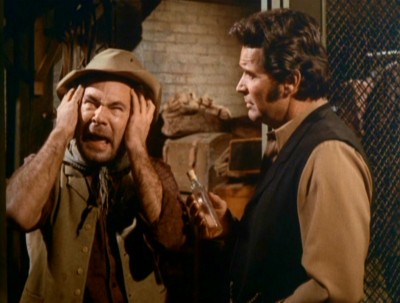
The New West, 1914. 18 year U.S. 7th Calvary veteran Nichols (James Garner), wary (and weary) of the latest technological advances that promise to stop future wars by killing more people more efficiently, resigns and returns to his home town of Nichols, Arizona. Hoping to capitalize on the country's craze to embrace modern times, Nichols thinks opportunity is knocking back home, and just waiting for a confident go-getter like himself to seize it. Unfortunately, once he gets a look at sleepy, forgotten, podunk little Nichols, Arizona, bypassed not only by the railroad but the whole world, he realizes his plan of action may need to change--particularly when he finds out his mother has died and his family ranch has been taken. Arriving in town with enigmatic, penniless sharpie Johnson (Paul Hampton), the terminally non-confrontational Nichols immediately catches the eye of weakling bully Ketcham (John Beck), the vain, stupid, blundering son of the town's all-controlling matriarch, grizzled, pissed-off Ma Ketcham (Neva Patterson). Ketcham, bored out of his skull like everyone else in town, sees Nichols' arrival as a chance to push around someone new, with Nichols all too glad to skip out of town...once he's busted up the Salter Hotel during a full-blown drunk. On the lam with Ruth (Margot Kidder), the sexy barmaid at Salter's, Nichols thinks he's being chased for the bar fight and because of Ruthie, but in reality, Ma and Ketcham and his posse want Ketcham's prized car back...which Johnson stole. Nichols, loathe to really shoot it out with Ma and Ketcham, works out a deal with the admiring Ma and returns to Nichols. There, he's forced by Ma to assume the town's sheriff duties, now shared with dirty little coward Mitch (Stuart Margolin), in lieu of paying off the bar's damages, with his makeshift "jail" established in the box room below Salter's hotel, and his horse traded in for the wave of the future: a Harley-Davidson motorcycle.
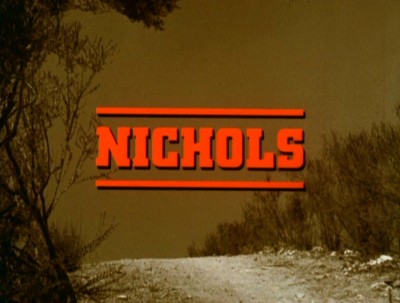
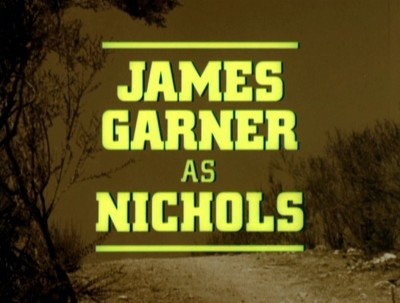
With an extensive movie and television career as varied and as successful as James Garner's has been, it would be tough, if not impossible, to single out just one project that embodied his appeal as a performer. You'd probably find just as many people to argue in favor of his role as "The Scrounger" in the big-screen WWII epic, The Great Escape, as you would millions of TV viewers split over his equally iconic outings, Maverick and The Rockford Files (I doubt you'll get very many The Pink Jungle advocates...). Of all his many efforts over the past six decades, though (still going strong at 85 years and counting...), Nichols occupies a small but unique spot as the one, at least according to Garner himself, that "got away." Often cited as a particular favorite of his (in his recent fun tell-all, The Garner Files: A Memoir, Garner states that Nichols's cancellation "about broke my heart."), Garner's frequent fond references to Nichols over the years has helped to create a bit of a cult reputation for the little-seen series. That rep has proved to be especially enticing to vintage TV fans since Nichols seemed, by description, to carry over some of the same thematic and character elements from Garner's first huge success, Maverick (the seemingly lazy, even "cowardly" pragmatist/opportunist who, through cunning and guile, always manages to land on his feet), while introducing some key components of his later television smash, The Rockford Files (the anti-authority, non-confrontational survivor who can't help but get continually drawn into trouble, particularly with weaselly "sidekick" Stuart Margolin around, and screenwriter Juanita Bartlett tapping away at the typewriter).
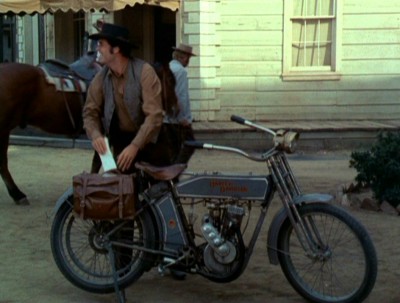
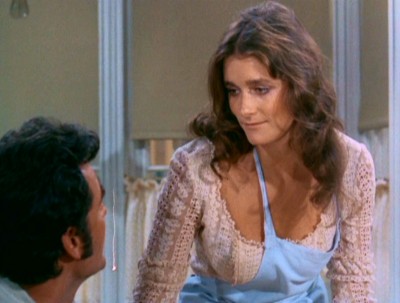
When the Nichols project came to Garner, courtesy of Oscar-winning heavyweight writer/producer/director Frank Pierson (Cat Ballou, Cool Hand Luke, Dog Day Afternoon, The Looking Glass War), the big screen star hadn't done television in over ten years, not since his notorious legal skirmish with Warner Bros. and Jack Warner over his restrictive Maverick contract. Taking control of his own career once he was freed from the Bros.' Warner, Garner moved effortlessly into features, peaking at the box office in the mid-sixties with popular outings like The Great Escape, The Thrill of It All, and Grand Prix. Still a popular star, Garner's movie profile was rapidly diminishing by 1971, though, with previous efforts like Mister Buddwing, How Sweet It Is!, The Pink Jungle, Marlowe, and A Man Called Sledge underperforming with critics and the public. Even though money was fronted for Nichols by the once-hated Warner Bros., Garner, a sensible businessman, was coming into Nichols as a full producing partner (his Cherokee Productions), backed up by some of the best writers and directors in the television business at that time (Gene L. Coon, Jack Curtis, Theodore J. Flicker, Marion Hargrove, George Kirgo, Benjamin Masselink, Frank Telford, John Badham, Paul Bogart, Ivan Dixon, Jeremy Paul Kagan, Gerd Oswald, Peter Tewksbury, and Frank Pierson, just to name a few). Expectations from the network, the sponsors, and the critics were high, considering the level of talent involved in Nichols.
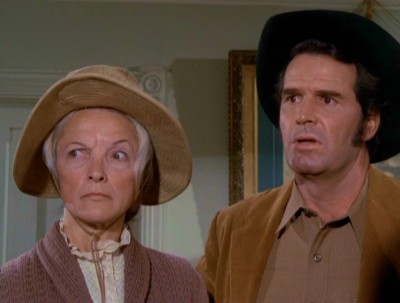
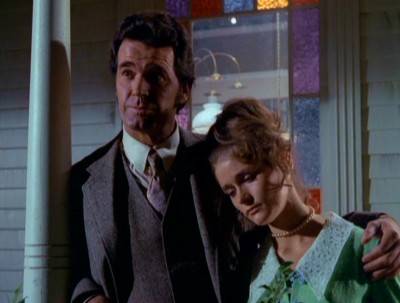
Armed with a solid commitment from NBC and sponsor Chevrolet, Nichols' first (and perhaps fatal, according to Garner) hurdle came with the delivery of the pilot to the Detroit suits at Chevrolet, where, according to Garner, an executive's wife reportedly disliked the program ("It's not Maverick," she stated). Chevrolet then promptly dumped half their sponsorship for the show (not unlike the financial situation that met Maverick's first season), forcing the Nichols producers to scramble for additional backing. Despite this major setback, Garner, whose Q rating was (and probably still is) through the roof, was shown how much NBC coveted his big-screen allure when Nichols was given the primo spot on the 1971-1972 NBC schedule: Thursday nights at 9:00pm, right after the second most-watched series in America, The Flip Wilson Show, and right before the 24th most popular show in the Nielsen's, The Dean Martin Show. Premiering in September, 1971, Nichols, opposite moderate-to-low competition from The CBS Thursday Night Movie as well as fellow one shot wonder, Longstreet, on ABC, failed to immediately generate the kinds of ratings and demos NBC expected of that time slot, causing the network to panic. First, they retitled Nichols to James Garner as Nichols, in the slim hope that all those TV Guide viewers would finally know this Western comedy starred the popular movie performer. When that didn't work, the series was moved in November (never a good sign) to its death slot: Tuesday nights at 9:30pm, with an absolutely dismal lead-in slate of George Kennedy's dire Sarge, the BBC miniseries import, The Search for the Nile and the horrific Gene Kelly-hosted variety show, The Funny Side. No matter how James Garner spins it now, Nichols got creamed here by the one-two-three punch of newcomer Cannon on CBS (28th for the year), and the combo of the last half-hour of The ABC Tuesday Night Movie (the 5th most-watched series on TV), with the first half-hour of Marcus Welby, M.D. (3rd in the Nielsen's), over on ABC. Ratings did marginally improve as Nichols soldiered on, which should have convinced NBC to stick with the series. However, the expense of the underperforming project coupled with its sponsorship problems doomed Nichols to a one season go-around (Garner frequently takes small comfort in asserting that no subsequent new series for NBC's 1972-1973 season received the kind of ratings Nichols did; however, Brian Keith's The Little People--soon to be retitled The Brian Keith Show--did better Nichols' ratings, cracking the coveted Nielsen Top Thirty for the 1972-1973 season). Contrary to many stories out there that Garner and company SPOILER ALERT killed off the Nichols character in the final episode, All in the Family, in a last-ditch effort to continue the series the following season, Garner has stated unequivocally this was not the case: the Nichols character was killed off as a general nose-thumbing to NBC for canceling his baby (watching that episode, it's clear Garner's "new" Nichols character was never intended to headline a revamped version of the show).
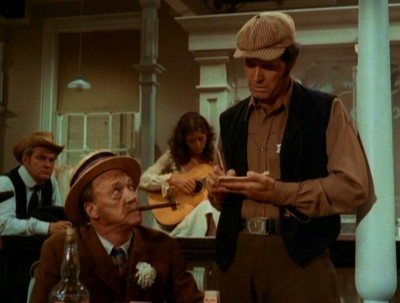
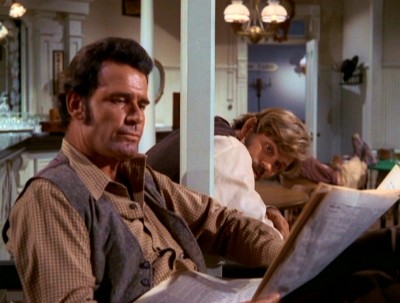
I mention all this background because such a big part of Nichols's allure today is its failure: nothing grabs a vintage TV fan like a really good show that never got its original due. How could such a prestigious product, starring a top-lined talent like Garner, fail so badly? Was it the sponsorship problems? Did the network run scared and ruin it by bad programming? Were viewers unaware of it? Or did viewers see it and say, "So what?" It's all guesswork, of course, but there are other factors involved, regardless of what's good and unique about Nichols, that certainly contributed to its early demise. Probably the biggest elephant in the room for Nichols was that it was a network Western at a time when the genre was all but dead on the airwaves. Stalwarts Bonanza and Gunsmoke were the sole survivors from the genre's 50s and 60s heyday (both of them remarkably still in the Nielsen Top Twenty in 1971), while only Butch Cassidy and the Sundance Kid knock-off Alias Smith & Jones, modern-day oater Cade's County with Glenn Ford, and sorta-kinda-maybe-Western newcomer Bearcats, with Rod Taylor, made the network's prime time schedules in 1971. Cop shows, detective series, sitcoms, and medical programs dominated the Nielsen's by this point; Westerns, right or wrong, were considered by the networks as passe entertainment for older, undesirable demographics--certainly ironic in Nichols' case, considering how the show was tweaked towards attracting younger viewers, too, with its anti-establishment, cynical humor.
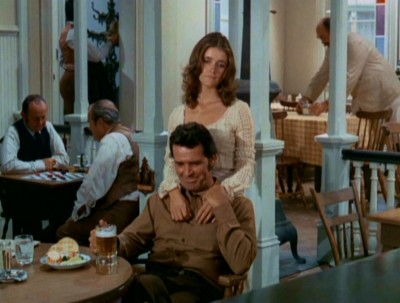
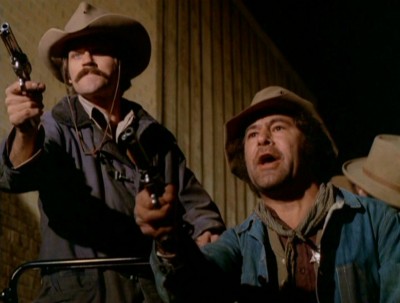
Not exactly helping matters, either, for Nichols,was its pilot, Nichols, written and directed by Pierson. I've written before how crucial that first look can be for establishing an audience for a new TV venture; if the first time a major sampling of viewers gets a peek at a finished product, and that premiere episode is awkward or conflicted in its goals, it can put a serious damper on the series' future prospects. Most network TV back in 1971 was still "comfort food" art. That's why a guy like James Garner was so well liked on the small tube; along with being a talented actor, he had a reassuring, agreeable on-screen presence that people liked welcoming into their homes over and over and over again. However, there's no getting around the fact that season opener Nichols is rough, with a peculiar, hesitant vibe that to my eye suggests heavy post-production tampering and re-tooling by someone. Details, from little to big, somehow get bungled. The credits sequence is distressingly uninspiring, with a "quaint," simpleton harmonica theme that doesn't help--a nit-picky point, you may think, but a crucial one to grab the viewer (tell me those things ultimately don't matter as you immediately conjure up the openings and themes of The Twilight Zone, Gilligan's Island, and The Brady Bunch just for starters). Worse, we can't exactly get a handle on either the Nichols character or the tone of the piece, with Pierson's herky-jerky construction and some really bad editing creating scene after scene that promise much...before they peter out without an adequate pay-off ("quirky" and "off beat" are fine, but you have to give the audience some kind of reward for sticking around with a new concept, especially in 1971 network television). Nichols's character is constantly in flux, as we try and figure out if he's a go-getter, a pacifist, a bar room brawler, a scammer, a lover, a disinterested loner, a coward, or a hero. Of course, he can be all of those things--as indeed Nichols is as the series develops--but he can't be all of those things at once in an introductory pilot if the pilot is so poorly produced and executed it alienates the viewer (I'm not sure if a couple of million people didn't decide to switch off Nichols the minute Pierson made the disastrous decision of having big-screen hero Garner actually come this close to being such a craven coward that he'd kiss a pig rather than fight John Beck). As for any potential young teen viewers or women--not traditionally fans of the Western genre--that might have strayed to this season opener, it probably wasn't the best idea to have tantalizing proto-hippie Margot Kidder (sexy as hell, projecting a playful, completely open attitude towards sex that's quite modern-feeling here) complain about opportunities for women in the New West...only to have Nichols tell her, "Now, look; you're a woman. Why don't you just settle for that?"
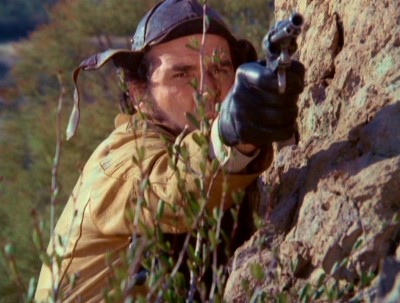
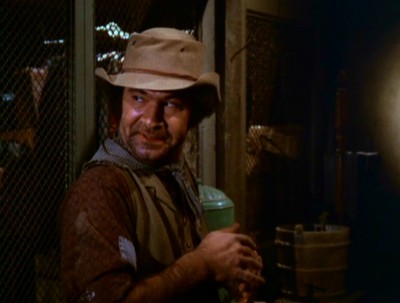
Nichols's protracted shakedown process--hindered greatly by some really jumbled, ass-backwards production date vs. air date programming--does make it harder for the average viewer to appreciate its numerous charms (and to the point: "average viewers" are exactly what Nichols needed to stay on the air). Nichols's tone, no matter how engaging, no matter how intriguing, not matter how intelligently off-beat, switches around so much during those crucial first few episodes, that it's no wonder average viewers, curious to see Garner back on the small screen, quickly ambled off to something else. The majority of the TV viewers back in 1971 still wanted to understand where they were in a show, and what was going on, right away. Characters come and go here without rhyme or reason (seeming co-star Paul Hampton is the biggest casualty here, in and out in 3 episodes; no need for two scammers when the star/producer's playing one of them), while others are marginalized to the point of superfluousness (John Beck, so funny as a dangerous dolt here, is eventually so underutilized he stars in two episodes as a different character altogether). We can't even get a handle on what Nichols is going to wear from episode to episode ("the clothes make the character," someone once said); first in that misfire get-up of jodhpurs and a checked cloth cap, like a Western Union page boy (it's not nearly as funny as they thought it would be, making Garner look silly, rather than cute), before he gradually morphs back into Bret Maverick, complete with rakishly tilted-back black Stetson (fairly ironic, when you consider the Chevrolet story). And as far as the consistency of Nichols' "gimmick" of a sheriff with no gun, in a TV season full of such hooks--blind investigator Longstreet, morbidly obese investigator Cannon, catatonically sedate investigator Owen Marshall, Counselor at Law--Nichols sure starts whipping those pistols and shotguns out with ever-increasing frequency as the season wears on, to the point where in the next-to-last episode, he's mowing down Mexican bandits with a machine gun.
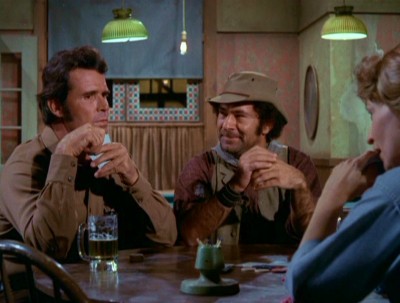
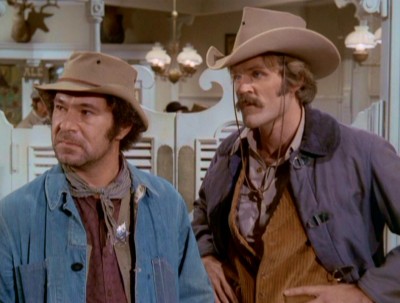
...which should all add up to me not recommending Nichols, right? At least that's the way the above reads back to me. Well...wrong. Because even with that tentative misfire of a pilot, and the jumbled episodes that seem to present several different versions of the same series, and the frequent creative starts and stops as the series found its footings, what is on the small screen, regardless of context, is frequently charming and highly amusing--particularly when the series finds its stride towards the end of its run (Garner and Margolin work out a truly memorable comedy duet here that will achieve iconic status later in The Rockford Files). When Nichols settles down into a post-Maverick/pre-The Rockford Files funky Western groove, its shaggy dog beguilement is undeniable, with Garner further refining an archetype--the captivating, non-violent scammer bent on self-preservation at all costs--that in retrospect he almost seems to have single-handedly invented. In The Siege, Ricardo Montalban, a Mexican revolutionary, incredulously asks Nichols, "Why you don't carry a gun?" "Why, I don't need one," responds Nichols, to which Montalban replies, "How you arrest people?" to which Nichols flatly states, "Moral authority." Coming out of Garner's cynical mouth, it makes for a fine line for the character to walk--reluctant authority figure who's anti-authority--and Garner does it beautifully. When Nichols ditches the sarcasm and tries to be too message-y, as in The Indian Giver, it loses its own unique smirk, coming off not as "caring" or "with it," or "concerned" by 1971 network standards, but as rather conventional (all the TV shows were faux-"relevant" during this period). Much better is Gene L. Coon's Ketcham Power, with Beck quite funny as the weirdly paranoid temporary sheriff obsessed with "domestic security," arresting anyone who even talks about him (famed TV director Peter Tewksbury effortlessly comes up with many little funny throwaways here, such as everyone rolling their eyes when Beck has trouble signing his own name).
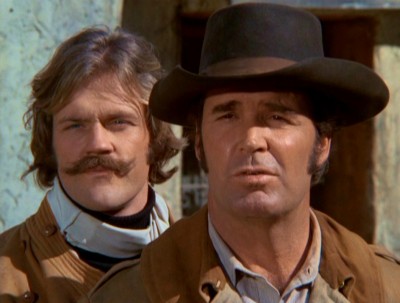
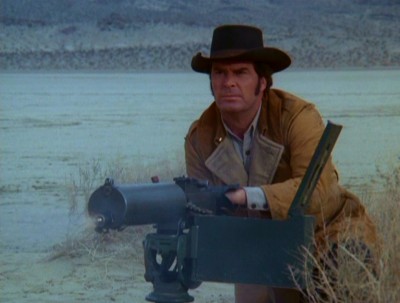
Gulley vs. Hansen, scripted by Shimon Wincelberg and directed by Pierson, does a neat job of skewering one of the more popular Western myths of hard, two-fisted men settling their scores the manly way: this time, it's Charles McGraw and Robert Gist in a pathetic, decades-long scrap over nothing, blown up to deadly proportions by bored Ketcham and Mitch. Nichols' ambivalence towards any action is most acute here (he's worried he could be wrong, and then someone may wind up dead), while we even get a Peckinpah slo-mo tribute--again ironic--when a buzzing fly causes Gist to tragically draw his pistol. Too bad the whole Indian set-up in Deer Crossing is overly familiar (with Ray Danton pretty silly as an Apache), but we do get further exploration of Nichols' "path of least resistance" approach to life, as well as Neva Patterson rounding out the unique, frequently hilarious "Ma" character--knowing, willful, waspish, vengeful, hilarious--wishing her weakling son would fail against a real man like Nichols. The Specialists is a rather sweet, sad parody of the big-screen The Professionals, from scripter George Kirgo, with an understanding, no judgments look at how we all want forgiveness for the toil time takes on our former glories (villain Henry Beckman is hilarious as a survivor even more forgiving and pragmatic than laid-back Nichols). There's a funny Altman-esque M*A*S*H baseball game in Peanuts and Crackerjacks, a rowdy outing with a Ben Hecht-like city council meeting full of back and forth bantering/bickering, and good work by Kidder who falls for a troubled baseball player.
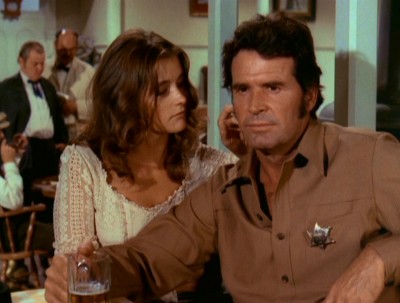
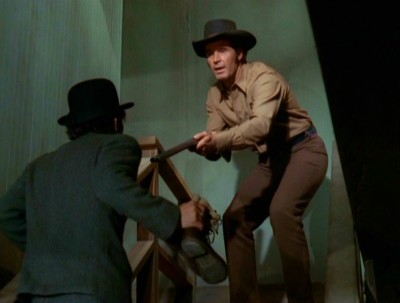
Paper Badge sports a boffo turn by Joyce Van Patten (very funny, as always), playing a sexy, manipulative actress (she's great with Garner; too bad they didn't bring her character back), while scripter Jack Curtis and cult director Gerd Oswald deliver the bizarre, almost surreal The One-Eyed Mule's Time Has Come, with Kristoffer Tabori and Garner battling dunce thieves Rayford Barnes, Roy Jenson and Jerry Summers in an earthquaked-ravaged home (lots of blind alleys here, keeping you guessing, with a funny mule right out of The Rounders). Away the Rolling River is a fairly familiar outing, with Steve Forrest quite good as an old friend of Nichols who can't let go of the "old" West. Of course, Nichols lands on his feet at the end, even collecting a reward for the train heist he aided--a very Maverick thing to do (Garner's and Margolin's act is getting better and better; here, they negotiate back and forth about how Margolin is going to "arrest" a wayward chicken, to hilarious results). Where Did Everybody Go? finds Nichols really picking up steam...even though I think it might have been only the second or third episode shot! Hampton is "back" one more time, while Nichols establishes his jail down in the hotel box room (which has been featured in "earlier" episodes). Jesse, Bill, and Alan Vint make their mark as the juvenile, petty Springer Brothers, causing havoc in the town while Nichols calmly writes down all their offenses. Nichols gets carefree slut Nira Barab at the end, along with half the fines he let the Springer Bros. rack up (Margolin telling Garner that window 'pane' is spelled, "P-A-I-N," is priceless, with Beck getting into the act, too, mumbling weirdly at one point like Popeye in this very funny outing). Kidder shines again in The Marrying Fool, bringing a nice, modern (and sexy) vibe to her bigamy-accepting Ruthie when she hooks up with many-times married Tom Skerritt (always interesting). By this point, it's clear that Garner and the producers are going to Margolin each episode for some choice comedy bits; his checker gamer in this episode is memorable ("My eyes!" he screams). Eddie Joe makes the mistake that The Indian Giver made, taking a sensitive subject--racism--and forgetting to laugh at it (a Nichols episode trying so hard to "say something," just comes off as ordinary). Paul Winfield, though, is excellent, as always, as the angry chef who longs to return to New Orleans. Zachariah, scripted by future Rockford Files veteran Juanita Bartlett, could be a Files episode incognito, such is the level of distrust, triple and quadruple crosses, and ever-switching sides as Nichols spars with his Uncle, perfectly cast by slimy, hilarious Strother Martin. Nichols wins, loses, then wins again--on a small scale, which is exactly where we want him to be.
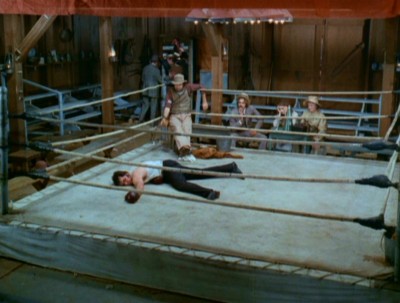
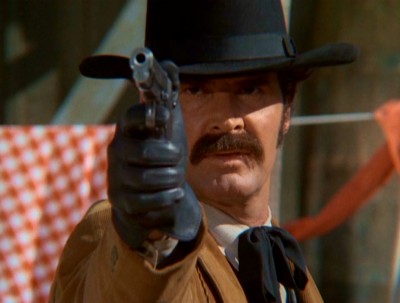
The Unholy Alliance is one of the funniest outings in the series, with Nichols caught up in a dream-like scenario (is it all a dream?) where he's thought to be a world-famous safe cracker. Priceless Liam Dunn shows up as the real crook (god I love those old actors), pissing and moaning and incongruously preening, while countless throwaway lines are bandied about with skill (huge Orwin Harvey as a surprisingly sensitive henchman is told to put down Nichols' hairbrush, to which he complains, "But he has such nice things."). Frank Telford comes up with the (nicely) complicated Slight of Hand, that benefits from old pro Dabs Greer (always spot-on) as a scamming loan shark (only Bo Hopkins seems off-kilter here, as if he doesn't get the jokes). Unfortunately, Wings of an Angel is a limp affair, with Beck playing an entirely different role here, to little effect. The fact that they make absolutely nothing out of his character looking like Ketcham--not even a split screen!--tells me they just gave the part to him to keep him happy (by this point in the series, Beck's foil role has been clearly usurped by Margolin). Much better is About Jesse James (labeled here, Man of the Cloth), with the always fun Jack Elam showing up as double-crossing sidewinder, and normally dead-serious Charles McGraw getting the biggest laugh out of me that he ever got when, after waking up from an opium overdose, he shakes that bulldog head of his and matter-of-factly states, "Well...that was interesting."
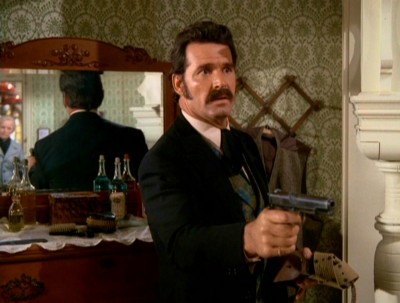
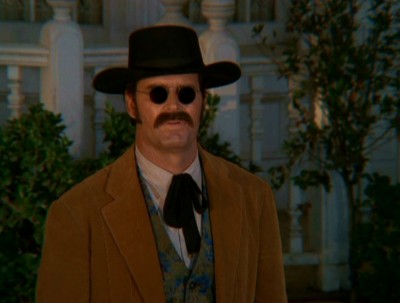
Fight of the Century may sport an overly-familiar boxing framework, but it's expertly crafted, with constant, smart-assed banter that feels like a classic American tall tale fashioned by sardonic grumps Twain or Bierce. Irreverent and brawling, with Nichols shown exactly how everyone feels about him: busted and broken on the boxing mat, from a beating he didn't want, they all grouse about him losing. Hilarious. Bertha, again by Bartlett, is a wonderfully droll outing when it sticks to Garner trying to keep Alice Ghostly's bar afloat while she tends to her visiting daughter (a subplot that doesn't really work). By now, Margolin's and Garner's comedy bits are the undoubted highlights of the episodes, full of pleading and coercion and conning--just like Rockford. Running with that act, Garner and Margolin have their best outing in Man's Best Enemy, where Nichols has to take care of Mitch's pit bull dog, by court order...turning frenzied, jealous Mitch completely insane (Lou Wagner as a serial killer almost steals it away from whining, crazed Margolin, screaming "Kill him/her/it!" anytime anyone is in trouble; his raucous "Aw you stink, you old hag!" to Ma Ketcham is perfection). Unfortunately, Man's Best Enemy is the final humorous outing here for Nichols. Wonder Fizz Flies Again features Beck-as-someone-else again in a dispirited retread of countless other south of the border revolution oaters, all rather direly put together here, while Nichols's fade-out, All in the Family, is a weird, strange, somber close to the show. Obviously made by a company of actors, writers and producers that wasn't happy about folding, All in the Family SPOILER ALERT viciously and crudely blasts away its lead character without any fanfare before it gets down to the business of punishing the perpetrators. We keep expecting Garner to make Nichols' mustachioed brother suddenly come "alive" and act just like the old Nichols--as the other characters keep hoping--but he resolutely does not, conveying a sour, pissed-off version of his Hour of the Gun Wyatt Earp that eloquently speaks to NBC's decision to cancel his series. Clearly this Nichols wasn't meant to headline any pie-in-the-sky second season; this Nichols is a vengeful Garner, destroying what's left of his joint creation while not giving the network the satisfaction of "playing nice" to the end. A decidedly unusual, even eerie outing that hits just the right spoiler note for a series that might have been just as memorable as the TV Garner-starrers that came before and after it.
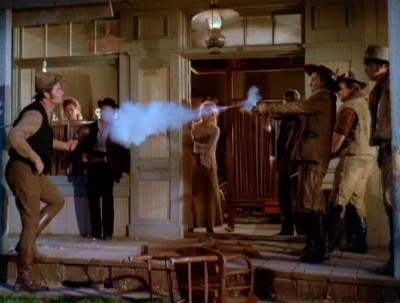
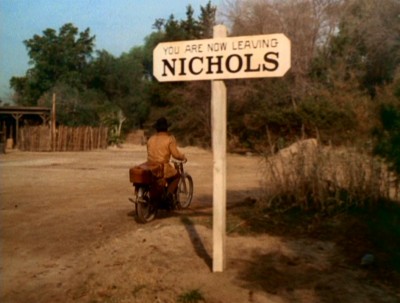
The DVD:
The Video:
The fullscreen, 1.37:1 transfers for Nichols: The Complete Series look pretty good, with decent (if at times a tad faded here and there) color, a sharp image, and few if any screen imperfections. Nice.
The Audio:
The Dolby Digital English mono audio track is serviceable, with low, un-bothersome hiss, and no subtitles or closed-captions.
The Extras:
No extras for Nichols: The Complete Series.
Final Thoughts:
It takes awhile to get its bearings, but once it does, it's memorable. Nichols' modern, cynical take on the Western genre wasn't all that groundbreaking in 1971, but it did come out at probably the worst time for such a vehicle on network TV, when horses and gunslingers were already largely ridden off the ranch. Denied a chance to grow--jeez, a measly 13th episode half-season pick-up would have killed you, NBC?--it's impossible to say where Nichols might have wound up in the pantheon of TV Western series. What is clear is that by the last third of this season, Garner and company were turning out some beautifully oddball, engagingly off-kilter outings. And when you think about it...that's more than a lot of "successes" out there. I'm highly, highly recommending Nichols: The Complete Series.
Paul Mavis is an internationally published movie and television historian, a member of the Online Film Critics Society, and the author of The Espionage Filmography.


|
| Popular Reviews |
| Sponsored Links |
|
|
| Sponsored Links |
|
|
| Release List | Reviews | Shop | Newsletter | Forum | DVD Giveaways | Blu-Ray | Advertise |
|
Copyright 2024 DVDTalk.com All Rights Reserved. Legal Info, Privacy Policy, Terms of Use,
Manage Preferences,
Your Privacy Choices | |||||||









